Paris and Writers: An Interview with Jake Lamar, Novelist & Playwright
- SUBSCRIBE
- ALREADY SUBSCRIBED?
BECOME A BONJOUR PARIS MEMBER
Gain full access to our collection of over 5,000 articles and bring the City of Light into your life. Just 60 USD per year.
Find out why you should become a member here.
Sign in
Fill in your credentials below.
Jake Lamar was born and raised in the Bronx, New York. As a boy he was deeply moved by James Baldwin’s Go Tell It On the Mountain, and Richard Wright’s Black Boy. These two books were among the first to make him start to think he “might like to be a writer one day.” He graduated from Harvard University and wrote for Time Magazine before publishing his first book, a memoir called Bourgeois Blues, in 1991. The following year he was selected for a little-known, but highly prestigious literary award, the Lyndhurst prize, which gave him the financial means to be able to come to Paris to live for a year. Twenty-two years and six books later, he is still here. He recently took the time to sit down and chat with us about his life in Paris and his work, including his most recent work, a play based on the famous feud between James Baldwin and Richard Wright, titled Brothers In Exile.
JH: What first brought you to Paris? And what has kept you here all these years?
JL: The inspiration was all the American writers who came before me. The first American writer I knew about who had come to Paris was James Baldwin. I read Go Tell It On the Mountain when I was 12 or 13, and I was blown away by that book. It’s an autobiographical novel about Baldwin growing up in a difficult family in Harlem, and I was growing up in a difficult family in the Bronx. I asked my teacher, “Who is James Baldwin?” And he said, “He lives in Paris.” It seemed like just such an exotic idea to me, that someone with that background could live in Paris. So around the same time I was first thinking I might want to be a writer, I also got the idea of someday going to Paris.
Twenty years later I finally had the chance. I arrived in September 1993. I knew one person, a friend from college who needed a flat-mate, in Vincennes, two metro stops outside of Paris. And I didn’t speak a word of French. But I found it very easy to meet people. One of the first people I met was the poet Ted Joans. I went to a reading of his, and he said, “Oh, you should come by my café.” He had his favorite café, the Café Le Rouquet on the Blvd. St Germain, and every Monday, Wednesday, and Friday, from 4-6 he would be there, just sort of holding court. When I went there for the first time, Hart Leroy Bibbs and James Emanuel were sitting there. Ted told me about Jim Haynes’s Sunday night dinners, I met my first Paris girlfriend at one of those dinners. I’d meet someone at Ted’s café and they’d invite me to their house for dinner. Then I’d go to the dinner and meet someone else. So I was able to get a social life pretty easily here.
I was having a great time, meeting interesting people, so I decided to stay for a second year. I moved from Vincennes to the 18th arrondissement, then stayed a third year, and at the end of the third year I met the woman I would go on to marry. So the first reason for wanting to stay was just the people I met here. I met great people. But I also loved the city, loved the feel of the place, loved the sidewalk cafes, the beauty of the place. And then once I started getting published here, about 12 years ago, I really began to appreciate how much the arts in general, and writing in particular, are appreciated here, the respect the French have for artists and writers. That’s something different than what we have in the States. In the States I think it’s more the idea of success that’s respected. Being a rich and famous writer is all that counts. Whereas here it’s the métier itself that’s respected.
JH: Can you say a little bit more about that?
JL: When I meet a French person for the first time, and I tell them I’m a writer, their first question is, “What do you write?” When I meet an American, their first question is “Would I have heard of you?” That says a lot. The French person is interested in writing. The American is interested in “Are you famous? Are you worth reading?” In the U.S. if you bring out a book, you have to hope the New York Times likes it. In France you’ve got three national daily papers, a slew of weekly magazines that cover literature and the arts, you’ve got a radio station like France Culture. In the U.S. you’ve got the Charlie Rose Show. Here you’ve got 10 different versions of the Charlie Rose Show. It’s a culture that values writing and writers. What we do is respected here.
JH: I want to ask you about your latest book, it’s called “Posthumous” in English, “Postérité” in French. And it has been published first in French. How did that happen?
JL: My French editor read it and loved it. I wrote it in English, I gave it to my agent in New York, and she shopped it around. I knew it would be a hard sell, because everybody has their “brand” now. And my brand is the black guy who lives in Paris and writes thrillers. But this book is not a thriller, it’s not set in Paris, and it has nothing to do with racial questions. This is a book about a Dutch abstract expressionist painter, and I think people just didn’t smell the money on the page, as Fitzgerald said. The aroma of money wasn’t there. Meanwhile my French editor, who had published my most thriller-ish books as well as my memoir, jumped at the chance to publish it. They hired a translator, and the book came out in September 2014. It got nice reviews.
JH: Has that helped for the English version?
JL: No, not at all! (laughs) It still doesn’t have an English language publisher.
But the book is out there, and I get nice responses to it, so…I sometimes joke that I’ve become a French writer who writes in English.
JH: I also want to ask you about your play, “Brothers in Exile.” Can you briefly summarize what it’s about, and explain how you came to write it? And maybe tell us when we might hope to see it staged?
JL: Well, the inspiration for the play initially was the relationship between Richard Wright and James Baldwin. These two writers were hugely important to me. Black Boy was one of the books that made me want to be a writer, just like Go Tell It On the Mountain. Then I read other works of theirs, and learned that they had both gone to Paris. I was in college when I learned about this feud that they had had. Wright had been a mentor to Baldwin. When they first met in New York, he helped him get a grant. And when Baldwin followed Wright to Paris, Wright helped him get his first magazine assignment. Then Baldwin wrote two essays that were very critical of Wright’s work, and Wright was not happy about this. They actually had two confrontations about what Baldwin had written. One was at the Brasserie Lipp, in 1949, and then in 1953 there was a second confrontation at the Café Deux Magots. Places that were affordable back then.
It was a long argument, it lasted for hours and covered a lot of subjects. So I knew about this feud, and I had the thought that this could be an interesting story to tell someday. Then when I came to Paris I discovered Chester Himes, a writer who is still under-recognized in the States. His first novel is called If He Hollers, Let Him Go, published in 1945. I think he’s right up there with the great American and African-American writers of that time, but he’s never been recognized in the U.S. In France, where he made his home for many years, he’s considered a major writer. So it was a revelation for me to discover Himes when I came to France, this great African-American author I didn’t know anything about. Then I was asked to review a biography of Richard Wright by Hazel Rowley, for the Washington Post. Reading that book, I discovered that during that whole long fight at the Deux Magots, Chester Himes was sitting at the table the whole time. And it turns out that all three of them wrote about what happened that night, and each gave a very different version of what had happened. When I learned that, I thought, okay, now it’s really a story, now we’ve got a third perspective.
So I had this idea for a novel that was just sort of percolating for a number of years. Then I got involved at the Théâtre MC93 as a literary consultant to this director who likes to adapt novels to the stage. I worked with him on an adaption of the USA trilogy by John Dos Passos, and then we worked on American Tabloid by James Ellroy. And I found that I really love working in the theater. Then one night it occurred to me, this Wright/Baldwin/Himes piece should really be a play. I thought it would be more interesting for the public to hear the voices of these writers rather than me trying to capture how they sounded on the page, to just let them speak for themselves. I applied for a French grant to write the play, got the grant, and wrote the play in English. My wife translated it into French, and for the past two years I’ve been trying to get it staged somewhere. I have an agent in New York shopping it, I’ve met with a director in London who seems interested, and I have a director for the French version who’d love to do it, but she doesn’t have a theater. But I sold the piece to France Culture, which is a 24-hour radio station. They broadcast concerts, readings of books and plays, interviews with writers. It’s a terrific station. They have a Sunday evening show which is all about theater. So, working with a producer, I adapted the French translation for the radio. And I’ve just learned that it has been slated for the 2015/16 season. So at some point in the next year it will be aired. I hope that will help lead to the play getting staged in France.
JH: Well it sounds fascinating, and each of these writers, each in their own right is so impressive, and so interesting. I can’t wait to see it somewhere…
JL: Well, it’ll happen. Everyone tells me these stories to encourage me. “You know, this one took five years, that one took seven years.” It’s hard to get things staged. It takes a lot of people all coming together: director, producer, actors…
JH: Of course, I want to also ask you about your Paris-based books, “Rendezvous Eighteenth,” and “Ghosts of St. Michel.” I’m a big fan of those two books, and I’m wondering if we’ll ever see the characters that appear in them come back again…
JL: Yeah, Ricky Jenks and Fatima. It was a long time before I was ready to write about Paris. And when I decided to write about Paris, about the Paris I knew, which is the 18th arrondissement, I didn’t want to write a travelogue. So that was why I turned to the thriller form, because I find it’s a great way to hook the reader, to deal with social and political issues without writing a polemic. Through the characters and the action you can convey a lot of ideas. I started Rendezvous Eighteenth after I had lived here for about seven years. And when my agent sold it to St Martin’s Press they offered a two-book deal, and the idea was that I would write a series of thrillerish books set in Paris. So I wrote Rendezvous Eighteenth, and then went straight into Ghosts of St. Michel. But y’know, I’m just not one of those writers. I know writers who always have the same protagonist and who write a series of books that you can follow chronologically. I enjoy reading those books, but I found I didn’t really want to write in that way. And by the time I finished writing the second book, I was sick of writing about Paris, so I went off in a completely different direction with Posthumous/Postérité. And then when I finished that I went into working on Brothers in Exile, which is kind of a return to form for me. It’s about Paris, it’s about racial questions, black characters, and there is a thriller element…because the play is set up as an enquête, an investigation into the mysterious circumstances surrounding Richard Wright’s death in 1960.
JH: I want to ask about the teaching that you do…you’ve taught in various French universities, and you’ve also taught American university students, right?
JL: Right. I’ve had lots of different teaching gigs. Right now I’m teaching in an MFA program out of the States called the Pan European MFA Program, out of Cedar Crest College in Allentown, Pennsylvania. It’s a long-distance MFA program. The students send me their chapters at the beginning of each month, I send my responses by the middle of each month, and then there is a residency every summer for two weeks, where all the faculty and students get together, each year in a different European city. The program’s still really new, the first year it was in Dublin, the second year in Barcelona, and this year it was in Vienna. So that’s my American job. In France I’ve taught creative writing, and also a course on the history and mythology of New York at the Ecole Polytechnique. Another really interesting job I’ve had is, about five or six years ago when I was working as a literary consultant at the MC93 Theater in Bobigny, I started a creative writing course in French. I taught at a library next door to the theater, and my students came from all sorts of backgrounds. They were French, Antillais, African, and Asian, aged from 25-75. I ran this workshop for four years, from 2009 to 20013. Now it has been dormant, for reasons of funding and other bureaucratic reasons, but I hope to pick it up again in October. But also through that literary consultant job I did a lot of work in French high schools and junior highs in the banlieue. Sometimes it’s just a four-week session, sometimes a whole semester.
JH: So you have had an inside view of life outside the périphérique. Do you want to talk about that? I’m not even sure what to ask other than what kind of insights that has given you into, well, all kinds of things, including some of the tensions that exist in French culture that came sort of smashing through the surface in January…
JL: Yeah, right. I would go even further back, to the riots in 2005 when the banlieue first exploded. And back then the French said, “Oh, we need to have a conversation about what’s happening in our society.” Well, they’ve been having the conversation for 10 years, but all they do is talk. What I’d say about the banlieue, I know Bobigny and Bondy, those are the places I know. People living in these places want what everybody wants. They want a secure life, a better life for their kids. France is interesting in that the inner city is an outer city, and at least in the case of Seine Saint-Denis (also known as the 93rd district, north of Paris), that was done deliberately. You have these jewel cities—Paris, Bordeaux, Lyon–and then around them are the rings of immigrant workers. In the 19th century, the city planners didn’t want Paris to look like London, with factories and belching smokestacks in the middle of the city. So they put the factories on the outside, in the 93rd district. So immigrants coming to France to work in these places were immediately ghettoized. Today the industry is gone, but the people are still coming, they’re still ghettoized. And now there’s less work.
I only visit these schools for a few weeks at a time. But I find if you can engage the kids, they’re as curious and enthusiastic as kids anywhere else. But I think the way the system is set up, they don’t get the attention and the encouragement they need. And France is such a hierarchical society. You don’t have the same avenues to the elite schools that we do in the U.S. They’re making an effort. So, for example, Sciences Po has a terrific recruitment program where they go to the banlieue and seek out the most gifted students and help them, basically train them to take the entrance exams so they can be tracked into these schools. Because that’s the path. In the U.S. it’s much more common for someone to come out of nowhere without an education, and make it big. It’s much harder to do in France. It’s a very hierarchical society, and so much depends on where you went to school. So you have to try to create ways for kids to be able to have those chances. But it’s tough.
Something like the Kouachi brothers, or these guys who are going off to Syria, joining ISIS, that’s a broader problem that I don’t think is going to be solved by any amount of social programs, that’s something that goes back to France’s colonial history. Take Algeria for example, after 140 years of colonialism you had this bloody civil war, Algeria’s fight for independence. After Algeria won its independence, they found themselves in dire straits economically, and there was a flood of immigrants into France from the 1960s on. You have kids who’ve grown up in this country, who don’t know Algeria. When right-wingers say, “Let them go back where they came from,” well, they came from St. Denis. They didn’t come from Algeria. And their bitterness comes from the idea that France wrecked their ancestral homeland, and is offering them nothing now. Radical Islam seems a way to vent their rage, but when they attack French society, it’s not with the idea of bettering anything. They’re not saying France should do this, that, and the other. It’s just rage. It’s just pay-back. I don’t know how you address that. I think it’s a terrible problem that’s gonna be with France for a long time.
JH: How is it different teaching French students and American students?
JL: Whether you’re teaching at the Ecole Polytechnique with elite students, or in the banlieue, French students are very shy about voicing an opinion. There’s a lot of just rote learning in French schools, a lot of “just listen to the teacher and don’t ask questions…” And so I’m always encouraging them to ask questions and dare to be wrong. They’re terrified of giving the wrong answer, much more than American kids. They live in fear of giving the wrong answers, being ridiculed. But I work to get them out of that. It’s not what they’re used to. So the main challenge is getting them to open up.
With French adults in the creative writing workshops in Bobigny, these workshops are still a relatively new thing in France. And I found one of the toughest things to get them to commit to, early on anyway, is just the methodology, the way I run a workshop. Which is that after people have read the work that’s being analyzed, the author has to remain silent while the rest of the class discusses first the strong points and then the weak points. Only after hearing all the comments is the author allowed to respond. This is such a set thing in my experience, teaching Americans. But it was hard to impose this order on the French when I first started, because one, French people are very quick to criticize, and two, they want to go right to the weak points before talking about the strong points. So then to try to get the author to be silent was difficult, they want to jump in and defend their work. And then I have to explain, “This is why we do it this way, because if you just go in on the attack, the author’s going to jump to defend himself or herself, and you’re just having an argument, you’re not having a discussion.” So it took a while to impose this method. But by the second year, when there were newcomers, the other participants would jump in for me, and say, “You’re not allowed to talk right now…[and] it’s strong points first…”
JH: What are you working on now? Are you willing to talk about that?
JL: There’s a short-term piece and a long-term piece I’m working on. In the short term, I’m working on a story which I was originally working on with a Belgian illustrator. It’s not a graphic novel, but a novel that would have illustrations. He had given me a bunch of images of jazz musicians in New York in the 1930s, 40s, 50s. So I came up with a crime story about a gangster in Harlem, and it covers his life from 1936 to 1961. It started out as an idea for a novella with illustrations. Then the illustrator’s deal with his publisher fell through, but the story wouldn’t leave me. So I’ve presented it to a French foundation, to see if I can get funding to write it as a novel. At the same time, after working with this producer at France Culture, I thought, “Oh, this would be a great radio piece, because France Culture has the rights to all these jazz tunes.” So I’m also seeing it as a radio play. I’ve written the first episode of the radio play, and submitted that to France Culture. So if I can get funding, I might end up writing a novel and a radio play from the same story.
I’m also working on a longer-term project about my parents. My first book was a memoir about my relationship with my father. Through our relationship and our difficulties as a father and son I wanted to show how racial politics in the U.S. had evolved between the 1930s, when my father was a boy, and the 1980s, when I was becoming a man. People have asked if I’d ever write a sequel, and I always said, “Not while my father’s still alive.” We were estranged anyway, but I also felt that the story didn’t have an ending while he was still with us. Then he passed away in 2013, and his death was not a surprise, but I was surprised by the extent to which my feelings about him actually were quite resolved. The shock for me was that, my mother was in a nursing home at the time, dementia had kicked in about a year earlier. She and my father had been divorced 30 years or more, they had a terrible marriage, and she really seemed sometimes quite still angry with him about some of the things he had done. And when she found out he had died she got really depressed. Then she had a whole sequence of health problems, and five months after my father died, my mother died. And that I was not prepared for at all.
Her reaction was so shocking to me, that in a way she was still connected to this man. So this sent me back to my notebooks, and I have been writing a lot in the past couple of years about their relationship, just trying to figure it out. And I didn’t know if this was something I would write as fiction, or memoir, or what. Then in March I got sick, I suddenly had to have open-heart surgery for a congenital heart problem I never knew I had, and I was confronted with my own mortality. So the long-term writing project is a book about my parents, about my own health crisis, about staring mortality in the face. But I’ve no idea when I will write that, or how I would publish it, if it would be a novel, or nonfiction…
JH: Well, thank you so much for taking the time to talk with me. But before I let you go, is there anything else you’d like to add?
JL: Well, I’d just like to say a word about James Emanuel, and Mavis Gallant, two Paris-based writers who were also good friends, both of whom have passed away in the last couple of years. They were both just so dedicated to their writing. For them it was not about pursuing fame, it was just about the craft. They lived the life, and they made sacrifices for their art. Both of them always encouraged me to stay with it. “Just do the work,” they said. So I just want to pay tribute to them.
Lead photo credit : Jake Lamar
More in writing in Paris
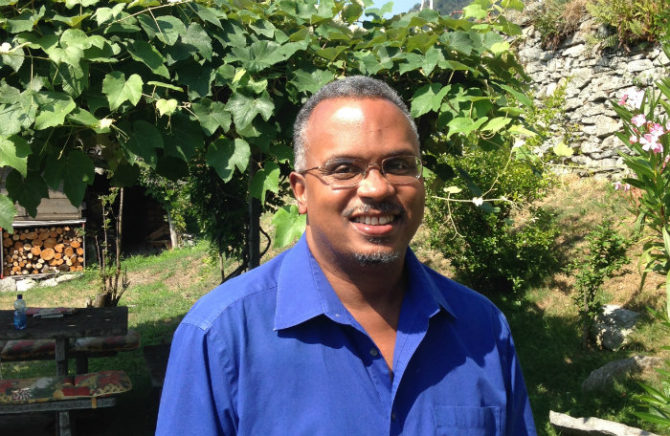
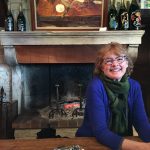
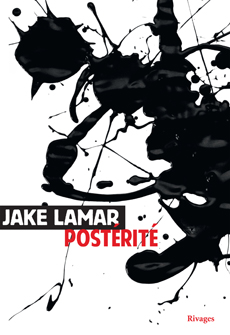
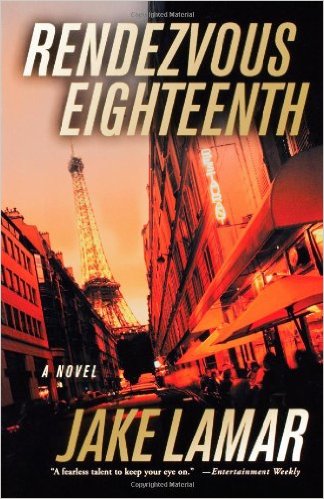
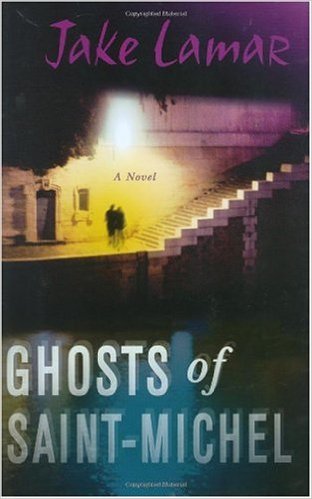
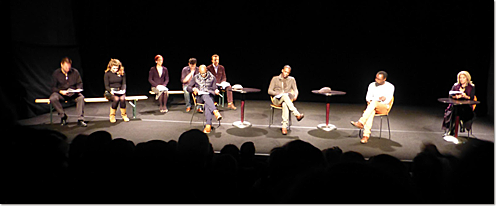
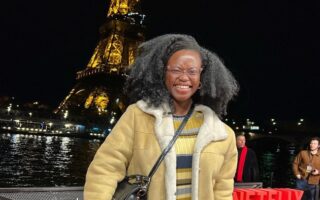
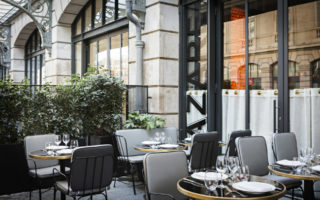

REPLY